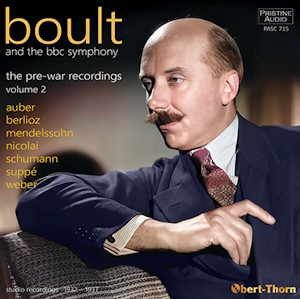
Sir Adrian Boult (conductor)
Boult and the BBC Symphony – The Pre-war Recordings Volume 2
rec. 1932-37, Abbey Road Studio No. 1, London; except Der Freischütz, Kingsway Hall, London
Pristine Audio PASC715 [2 CDs: 117]
Pristine Audio’s non-chronological approach to Boult’s pre-war BBC legacy allows for a programmatic look at the repertoire. There will be four volumes, of which this is the second. It focuses on overtures and other smaller works, that reveal the exceptionally high standards of execution that the BBC Symphony maintained throughout the 1930s under Boult’s direction.
There are two examples of Boult’s way with Weber from five years apart, three familiar Mendelssohns and a trio of Berlioz pieces – Boult infringing on Hamilton Harty’s hegemony – all on CD1. What all the performances have in common, other than being (largely) on two sides of a 78 – two of the Berlioz pieces extend to three sides – is the dynamism Boult brings to the music and the characterful contributions of the winds and horns in particular. Aubrey Brain, for example, is outstanding in the Nocturne from A Midsummer Night’s Dream. The string playing throughout is graceful, whether Arthur Catterall is leading or, after him, Paul Beard. Rhythms tend to be propulsive but never metronomic. Boult’s surprisingly good in Berlioz and I think his recording of the overture to Les francs juges – the one with the music used for John Freeman’s ‘Face to Face’ TV interviews (if you’re aged enough to recall them) – was the first recording of it ever made.
The second disc spans the years too, from 1932 to 1937. Tried and tested favourites, such as Suppé’s Light Cavalry overture share space with a much rara avis in the shape of Auber’s Masaniello overture and both sound idiomatic. Boult’s catholicity of repertoire was a decided asset in most music during his BBC tenure. There’s a very early example of the BBC orchestra in Elgar’s May 1932 orchestration of the Funeral March from Chopin’s Second Piano Sonata. Elgar was in the studio to hear a work he’d been asked to write specifically for the recording. One can hear the string portamenti flecking the B section.
Boult himself had been a recording artist since his first sessions in 1920-22 and the standard he maintained at the BBC encouraged such guest conductors as Koussevitzky, Elgar, Fritz Busch, Bruno Walter and Toscanini to direct the orchestra in concerts and on discs.
Some of these sides have been reissued before. Two of the Mendelssohns and two of the Berlioz pieces as well as the Nicolai overture to The Merry Wives of Windsor were transferred on Dutton CDBP9763. Once again, Mark Obert-Thorns’s transfers are much to be preferred, though they preserve some high-level hiss the better to keep things ‘open’. They’ve not been treble-starved to death, unlike the Dutton.
There’s a one-page producer’s note from Obert-Thorn to set the scene.
Are you a fan of computer-generated colorization? If so, you can see Boult in colour on the front of the twofer.
Jonathan Woolf
Availability: Pristine Classical
Contents
Christoph Willibald von Weber (1876-1826)
Der Freischütz – Overture
Euryanthe – Overture
Felix Mendelssohn (1809-1847)
Hebrides Overture (Fingal’s Cave), Op. 26
Nocturne from A Midsummer Night’s Dream, Op. 61
Aubrey Brain (solo horn)
Ruy Blas – Overture, Op. 95
Hector Berlioz (1803-1869)
Les francs juges Overture, Op. 3
Le roi Lear Overture, Op. 4
Roman Carnival Overture, Op.9
Daniel Auber (1782-1871)
Masaniello – Overture
Otto Nicolai (1810-1849)
The Merry Wives of Windsor – Overture
Fryderyk Chopin (1810-1849)
Funeral March from Piano Sonata No.2 in B flat minor, Op.35 orch. Elgar
Robert Schumann (1810-1856)
Manfred – Overture, Op. 115
Franz von Suppé (1819-1895)
Light Cavalry – Overture


















